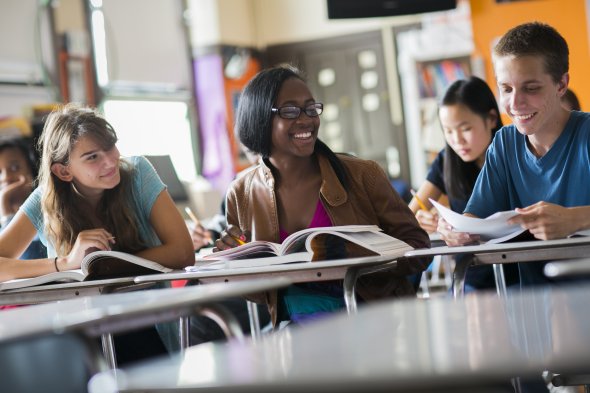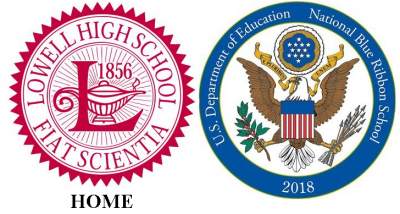
English Department at Lowell
The English Department at Lowell follows the Common Core State Standards for Literacy, starting with the 9th grade introduction to world literature, followed up by the 10th grade look at experiences and beliefs through a cultural context, 1th and 12th grade courses include general, honors and AP options in language, literature and composition. Elective classes include journalism and yearbook.
English Language course general description Link to this section
9th Grade Freshman Course
This first year of English serves as an introduction to world literature. Throughout the year, students study a variety of literary texts, including poetry, short stories, drama, mythology and the novel. Students learn to distinguish between the literal and figurative meanings in these works, terminology related to literary analysis, and new vocabulary from the reading. They also learn about the structure of an essay and review principles of English grammar as they apply to their writing.
10th Grade Sophomore Course
In one semester sophomores read novels, short stories, plays and poems about experiences such as loss of innocence, initiation into adulthood, and self-discovery. They consider the cultural context of a literary work and pay close attention to its language, including word choice and figurative expressions. Students also continue mastering literary terms and working on essay-writing skills.
In the other semester students read writers of different backgrounds, beliefs, and experiences, exploring not only what makes them distinct, but how much they still have in common. They build on close reading skills, examining the effect of a writer’s choices and techniques on the larger meanings of the work, and continue mastering literary terms and working on essay-writing skills.
11th Grade Junior Course options
American Literature: What is American identity? How has it changed and developed over time? In this class students will examine what defines literature as American, considering gender, class, race, and other societal forces. They will study novels, stories, poems, speeches, essays and/or plays from a diverse range of American voices and time periods, thinking, talking, and writing about differing visions of American life and ideas.
AP English Language and Composition: The junior AP program prepares students for the Advanced Placement Examination in Language and Composition, and for college-level work in general, focusing particularly on close reading and analysis of complex texts, developing and supporting arguments, and synthesizing sources into an argument. In each course students read both fiction and non-fiction texts, organized around a specific theme, and study language and rhetoric, while developing skills such as writing, critical thinking, and collaboration.
12th Grade Senior Course options
English/European Literature: In what ways are European classics still relevant to the world today? Why do we still quote Shakespeare, and why do so many contemporary films and television shows still draw from Jane Austen’s novels? Reading works by authors such as Chaucer, Shakespeare, and Austen, students will examine English literary tradition and discuss how ideas in the literature connect to our experiences today.
AP English Language and Composition: Non-Fiction: Senior AP Language prepares students for the Advanced Placement Examination in Language and Composition, which junior AP students also take. This course focuses on close reading of nonfiction texts, looking at how authors develop an argument, including the rhetorical choices they make. Students examine works such as advertisements, news articles, essays, speeches, and political cartoons to see how messages are delivered to a specific audience and for what purpose. They also practice writing for specific purposes and effects.
AP English Literature and Composition: This course prepares students for the Advanced Placement Examination in Literature and Composition and provides intense and sustained work in the close reading of imaginative literature, including poetry, considering the unique styles and tones of each work. As writers, students refine the skills acquired in their prior English courses.
Additional course offerings:
Communications and Writing: In this course, students develop the skills necessary to meaningfully interact and effectively communicate in three modes: collaborative, interpretive, and productive. Through collaborative structures, students engage in textual analysis, strategy development, and extensive reading. Students participate in academic conversations, debates, formal speeches, and presentations. Students write to express their understanding and make arguments about texts. In their written and oral presentations, students are able to vary their language, style and argumentation based on their audience and identify when authors are doing the same. Ultimately, students attain the ability to independently and purposefully select texts which deepen their understanding of a particular personal, academic or career interest.
This page was last updated on February 2, 2022

